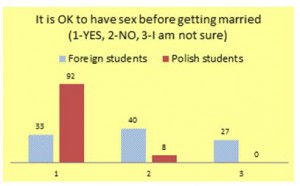Intercultural differences among students in Poland
I conducted a small research on intercultural differences among students in Poland. Sample is small, but I found very large differences. Summary is below, comments are welcome.
The purpose of this research was to identify the possible intercultural differences between Polish and foreign students. Author used a very small sample, so the results should be generalized. The purpose was to identify what could be the possible areas where these differences might appear in order to design a proper, large survey in an efficient way. There are several potential important areas where the differences appear:
- The biggest differences were about sex and German cars. Foreign students think German cars are best in the world, and that sex before marriage is not acceptable. Poles disagreed;
- In general foreign students have less liberal views regarding family and marriage. On top of differences regarding sex before getting married , foreign students respect parents view about the future husband or wife. Polish students seem to have different approach, ignore the parents view and think that sex before getting married is acceptable;
- Polish students drink alcohol from time to time, while very few foreign student do;
- Foreign student respect the wisdom of seniors, Polish students think that seniors cannot teach them much;
- Foreign students prefer football, Polish student other sports;
- Foreign students think that global warming is a threat to humanity, Polish students are not sure;
- In other researched areas there are remarkable similarities between both groups, in particular they want to have a good work-life balance, and prefer to work for a private sector, possibly in their own company, than in the public administration;
- Social capital of both groups is very low, students said that other people cannot be trusted and that their government is corrupt. It was surprising to find out that more Polish students thought that their government was corrupt. Surprise comes from a fact that majority of foreign students come from countries with lower GDP per capita than Poland’s, and corruption index is strongly inversely correlated with income.
This paper identified several areas of possible intercultural differences between Polish and foreign students. With sizeable growth of foreign student population projected in the coming years this paper should shed some light on how proper, large sample surveys should be designed to capture the intercultural differences among students from different countries.
